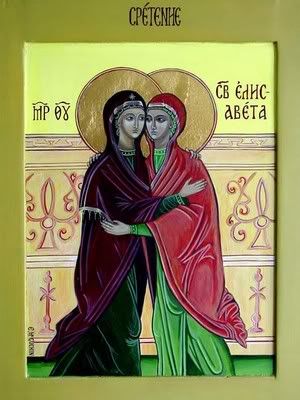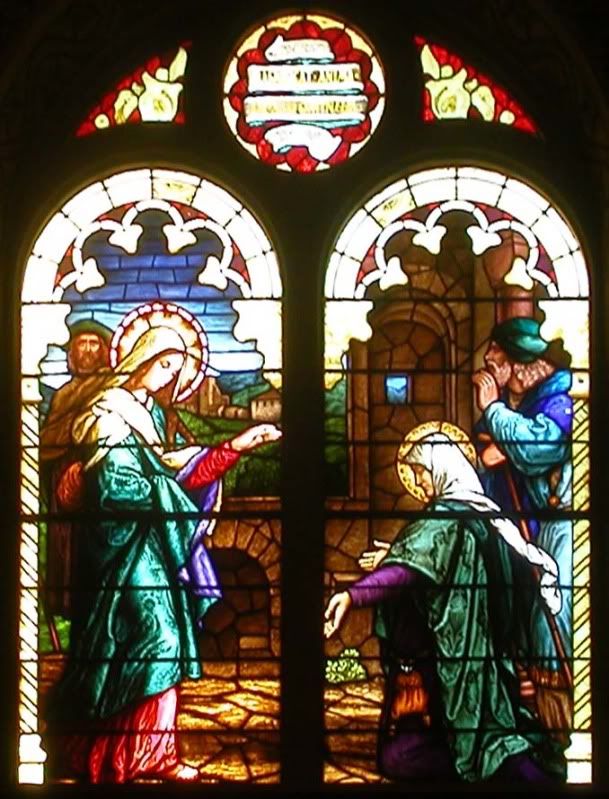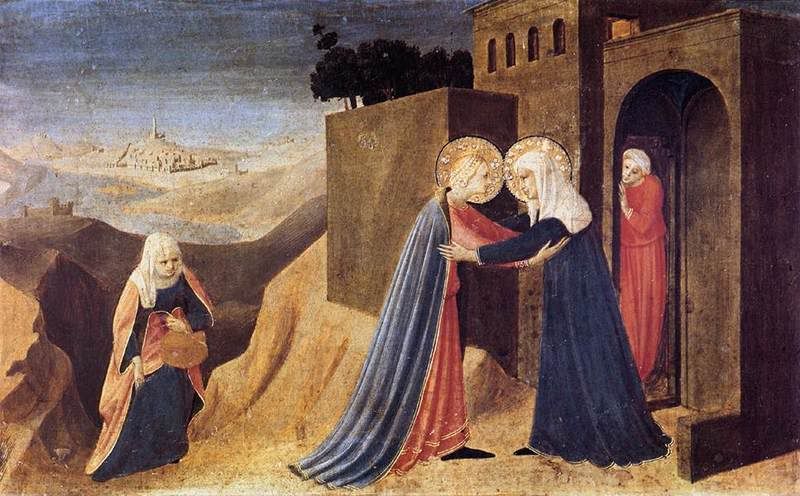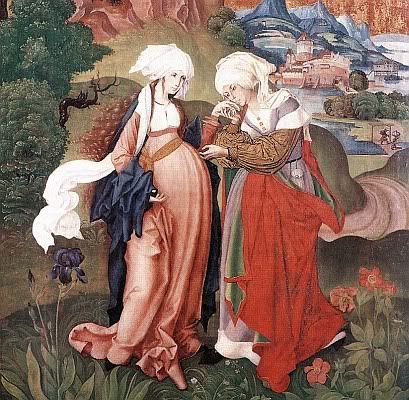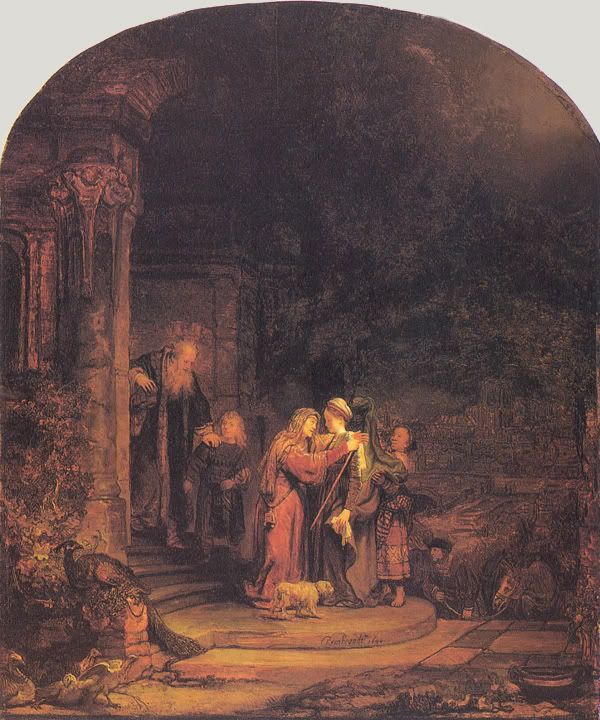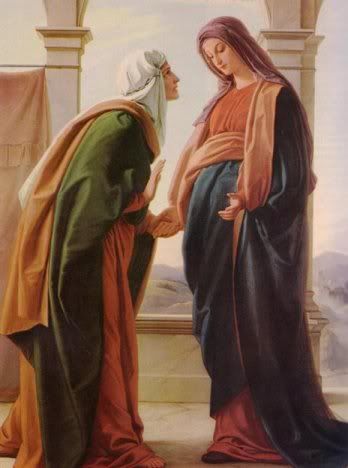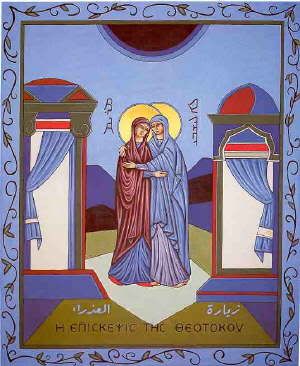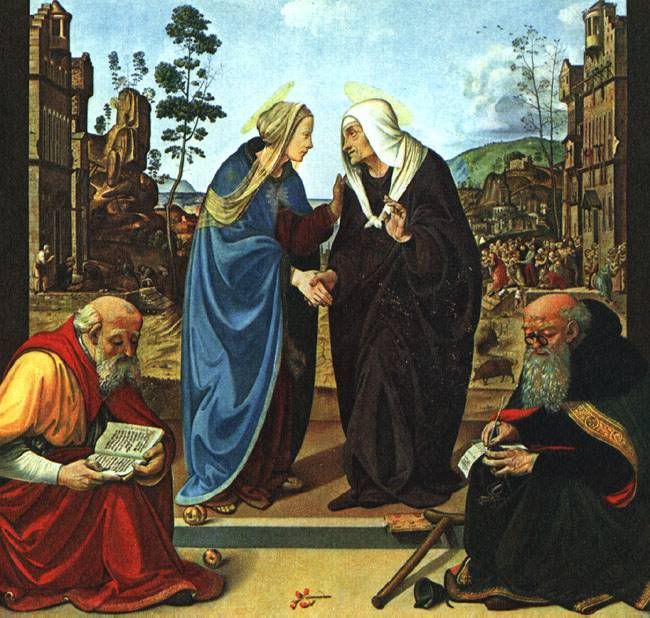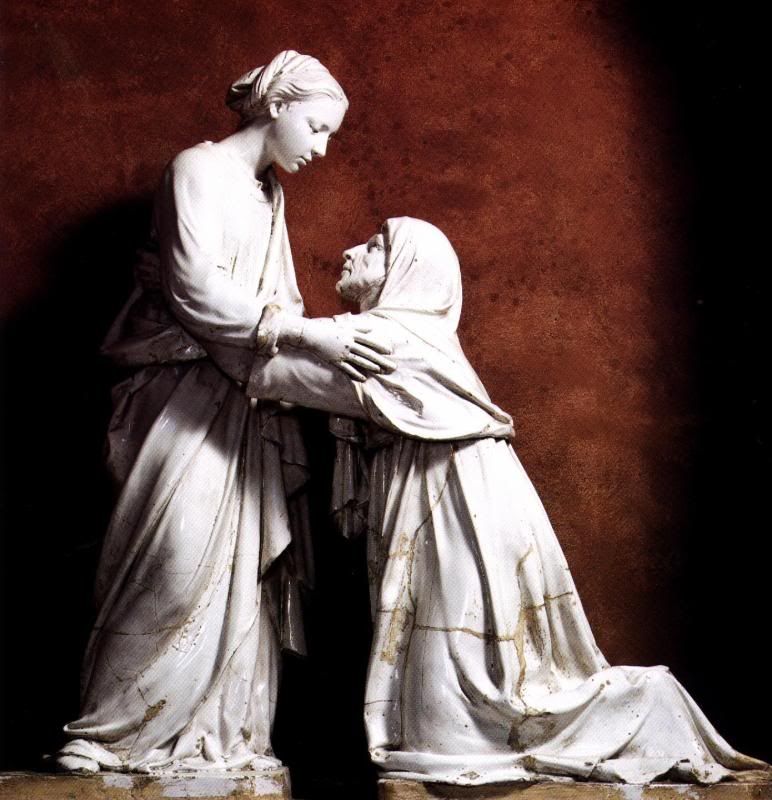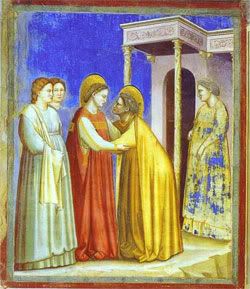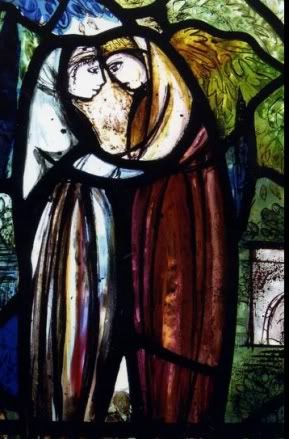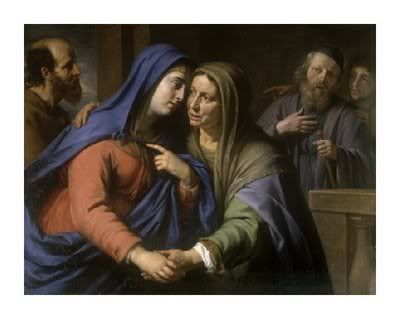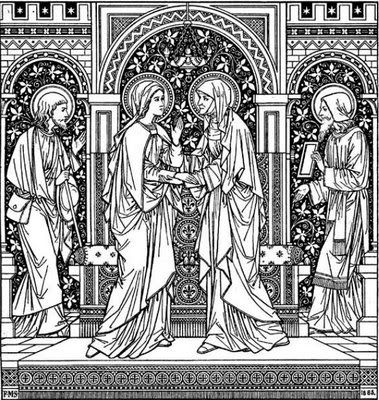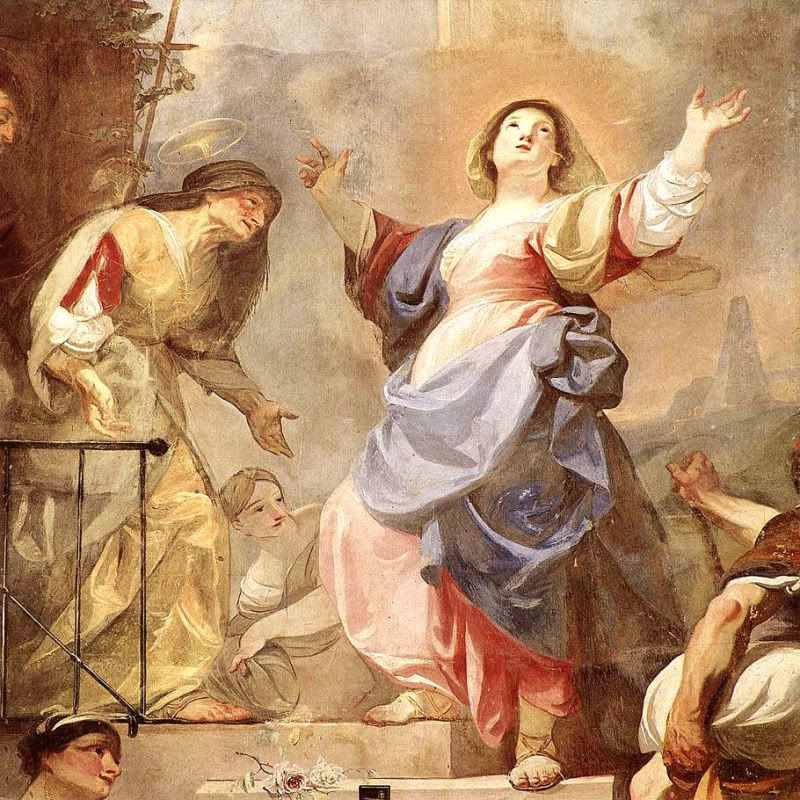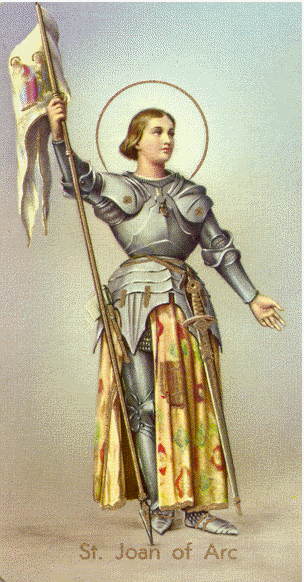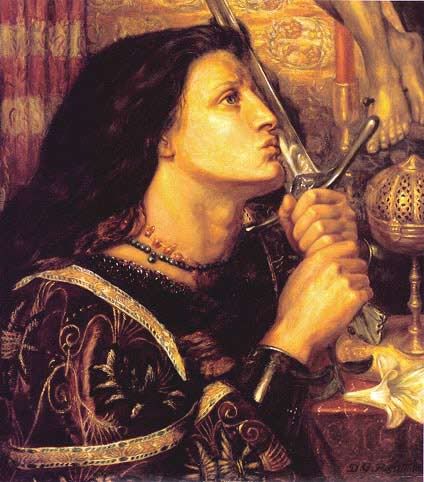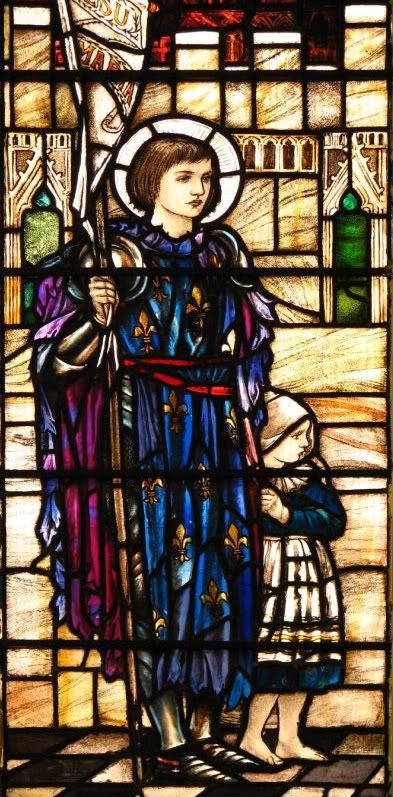As we celebrate the feast of the Visitation of Mary to Elizabeth, we also pause to remember the Immaculate Heart of Our Blessed Mother. Pope Benedict XVI offered the folloing reflection on Mary, encouraging us each to “behold Mary’s simple, sublime greatness.” In his reflection, he discusses the beauty, transformative power, and tradition of praying the Holy Rosary, and links Mary’s Visitation to both her Immaculate Heart and the Eucharist. He said, "Yes, to receive Jesus and to take him to others is the true joy of the Christian! Let us follow and imitate Mary, profoundly Eucharistic soul, and our whole life will become a Magnificat."
Dear Brothers and Sisters,
Today we are celebrating the Feast of the Visitation of the Blessed Virgin and the memory of the Immaculate Heart of Mary. Therefore, everything invites us to turn our trusting glance to Mary. To her, also this evening, we addressed the ancient and ever actual pious practice of the Rosary.
The Rosary, when it is not a mechanical, traditional form of repetition, is a Biblical meditation that allows us to trace the events of the Lord's life in the company of the Blessed Virgin, pandering them, like her, in our heart.
In many Christian communities during the month of May there is the beautiful custom of reciting the Holy Rosary in a more solemn way in families and in parishes. Now, that the month is ending, may this good habit continue. Rather, may it continue with more commitment so that, at the school of Mary, the lamp of faith may shine ever more in the hearts and homes of Christians.
In today's Feast of the Visitation the liturgy has us listen again to Luke's Gospel passage that recounts Mary of Nazareth's journey to the home of her elderly cousin Elizabeth.
A new chapter begins
Let us imagine the Virgin's state of mind after the Annunciation, when the Angel left her. Mary found herself with a great mystery enclosed within her womb; she knew something extraordinarily unique had happened; she was aware that the last chapter of salvation history in the world had begun.
But everything around her remained as before and the village of Nazareth was completely unaware of what had happened to her.
Before worrying about herself, Mary instead thought about elderly Elizabeth, who she knew was well on in her pregnancy and, moved by the mystery of love that she had just welcomed within herself, she set out "in haste" to go to offer Elizabeth her help. This is the simple and sublime greatness of Mary!
When she reaches Elizabeth's house, an event takes place that no artist could ever portray with the beauty and the intensity with which it took place.
The interior light of the Holy Spirit enfolds their persons. And Elizabeth, enlightened from on high, exclaims: "Blessed are you among women, and blessed is the fruit of your womb! And why is this granted me, that the mother of my Lord should come to me? For behold, when the voice of your greeting came to my ears, the babe in my womb leaped for joy. And blessed is she who believed that there would be a fulfilment of what was spoken to her from the Lord" (Lk 1:42-45).
These words could appear to us out of proportion with respect to the real context. Elizabeth is one of the many elderly people in Israel and Mary is an unknown young woman from a lost village of Galilee. What can this be and what can they accomplish in a world where other people count and other powers hold sway.
Overturning thrones
Yet, once again Mary amazes us; her heart is limpid, totally open to God's light. Her soul is without sin, it is not weighed down by pride or selfishness. Elizabeth's words enkindle in her spirit a canticle of praise, which is an authentic and profound "theological" reading of history: a reading that we must continually learn from the one whose faith is without shadow and without wrinkle.
"My soul proclaims the greatness of the Lord". Mary recognizes God's greatness. This is the first indispensable sentiment of faith. It is the sentiment that gives security to human creatures and frees from fear, even in the midst of the tempest of history.
Going beyond the surface, Mary "sees" the work of God in history with the eyes of faith. This is why she is blessed, because she believed. By faith, in fact, she accepted the Word of the Lord and conceived the Incarnate Word. Her faith has shown her that the thrones of the powerful of this world are temporary, while God's throne is the only rock that does not change or fall.
Her Magnificat, at the distance of centuries and millennia, remains the truest and most profound interpretation of history, while the interpretations of so many of this world's wise have been belied by events in the course of the centuries.
Dear brothers and sisters, let us return home with the Magnificat in our heart. Let us bring the same sentiments of praise and thanksgiving of Mary to the Lord, her faith and her hope, her docile abandonment in the hands of Divine Providence.
May we imitate her example of readiness and generosity in the service of our brethren. Indeed, only by accepting God's love and making of our existence a selfless and generous service to our neighbour, can we joyfully lift a song of praise to the Lord.
May the Blessed Mother, who invites us this evening to find refuge in her Immaculate Heart, obtain this grace for us.
Why pray the Rosary every day for a year?
Each time the Blessed Virgin has appeared-- whether it be to Saint Bernadette Soubirous at Lourdes; to Lucia, Jacinta, and Francisco at Fatima; or to Mariette Beco at Banneux-- she has asserted the importance, saving grace, and power of praying the Holy Rosary on a daily basis. Based upon her words, the Rosary is penance and conversion for sinners, a pathway to peace, an end to war, and a powerful act of faith in Jesus Christ. Pope Paul VI presented the Rosary as a powerful means to reach Christ "not merely with Mary but indeed, insofar as this is possible to us, in the same way as Mary, who is certainly the one who thought about Him more than anyone else has ever done."
To show us how this is done, perhaps no one has been more eloquent than the great Cardinal Newman, who wrote: "The great power of the Rosary consists in the fact that it translates the Creed into Prayer. Of course, the Creed is already in a certain sense a prayer and a great act of homage towards God, but the Rosary brings us to meditate again on the great truth of His life and death, and brings this truth close to our hearts. Even Christians, although they know God, usually fear rather than love Him. The strength of the Rosary lies in the particular manner in which it considers these mysteries, since all our thinking about Christ is intertwined with the thought of His Mother, in the relations between Mother and Son; the Holy Family is presented to us, the home in which God lived His infinite love."
As Mary said at Fatima, "Jesus wants to use you to make Me known and loved. He wishes to establish the devotion to My Immaculate Heart throughout the world. I promise salvation to whoever embraces it; these souls will be dear to God, like flowers put by Me to adorn his throne."

Today, we celebrate the feast day of the Visitation of Mary to Elizabeth. Below, a homily delivered by Saint Bede the Venerable, Doctor of the Church, regarding the Magnificat of Our Blessed Mother-- her praise and thanksgiving for all the gifts given unto her by the Lord. Saint Bede's homily on the Visitation of Mary to Elizabeth (the second Joyful Mystery of the Holy Rosary), and his commentary on Mary’s Magnificat (as found in the Gospel of Luke), illuminate the sanctity and love of Our Blessed Mother.
Homily by Saint Bede regarding the Visitation of Mary to Elizabeth.
My soul proclaims the greatness of the Lord, and my spirit rejoices in God my savior. With these words Mary first acknowledges the special gifts she has been given. Then she recalls God’s universal favors, bestowed unceasingly on the human race.
When a man devotes all his thoughts to the praise and service of the Lord, he proclaims God’s greatness. His observance of God’s commands, moreover, shows that he has God’s power and greatness always at heart. His spirit rejoices in God his saviour and delights in the mere recollection of his creator who gives him hope for eternal salvation.
These words are often for all God’s creations, but especially for the Mother of God. She alone was chosen, and she burned with spiritual love for the son she so joyously conceived. Above all other saints, she alone could truly rejoice in Jesus, her savior, for she knew that he who was the source of eternal salvation would be born in time in her body, in one person both her own son and her Lord.
For the Almighty has done great things for me, and holy is his name. Mary attributes nothing to her own merits. She refers all her greatness to the gift of the one whose essence is power and whose nature is greatness, for he fills with greatness and strength the small and the weak who believe in him.
She did well to add: and holy is his name, to warn those who heard, and indeed all who would receive his words, that they must believe and call upon his name. For they too could share in everlasting holiness and true salvation according to the words of the prophet: and it will come to pass, that everyone who calls on the name of the Lord will be saved. This is the name she spoke of earlier: and my spirit rejoices in God my savior.
Therefore it is an excellent and fruitful custom of holy Church that we should sing Mary’s hymn at the time of evening prayer. By meditating upon the incarnation, our devotion is kindled, and by remembering the example of God’s Mother, we are encouraged to lead a life of virtue. Such virtues are best achieved in the evening. We are weary after the day’s work and worn out by our distractions. The time for rest is near, and our minds are ready for contemplation.
Saint Bede’s Commentary on Mary’s Magnificat:
And Mary said: My soul proclaims the greatness of the Lord, my spirit rejoices in God my Savior.
The Lord has exalted me by a gift so great, so unheard of, that language is useless to describe it; and the depths of love in my heart can scarcely grasp it. I offer then all the powers of my soul in praise and thanksgiving. As I contemplate his greatness, which knows no limits, I joyfully surrender my whole life, my senses, my judgment, for my spirit rejoices in the eternal Godhead of that Jesus, that Saviour, whom I have conceived in this world of time.
The Almighty has done great things for me, and holy is his name.
Mary looks back to the beginning of her song, where she said: My soul proclaims the greatness of the Lord. Only that soul for whom the Lord in his love does great things can proclaim his greatness with fitting praise and encourage those who share her desire and purpose, saying: Join with me in proclaiming the greatness of the Lord; let us extol his name together.
Those who know the Lord, yet refuse to proclaim his greatness and sanctify his name to the limit of their power, will be considered the least in the kingdom of heaven. His name is called holy because in the sublimity of his unique power he surpasses every creature and is far removed from all that he has made.
He has come to the help of his servant Israel for he has remembered his promise of mercy.
In a beautiful phrase Mary calls Israel the servant of the Lord. The Lord came to his aid to save him. Israel is an obedient and humble servant, in the words of Hosea: Israel was a servant, and I loved him.
Those who refuse to be humble cannot be saved. They cannot say with the prophet: See, God comes to my aid; the Lord is the helper of my soul. But anyone who makes himself humble like a little child is greater in the kingdom of heaven.
The promise he made to our fathers, to Abraham and his children for ever.
This does not refer to the physical descendants of Abraham, but to his spiritual children. These are his descendants, sprung not from the flesh only, but who, whether circumcised or not, have followed him in faith. Circumcised as he was, Abraham believed, and this was credited to him as an act of righteousness.
The coming of the Saviour was promised to Abraham and to his descendants for ever. These are the children of promise, to whom it is said: If you belong to Christ, then you are descendants of Abraham, heirs in accordance with the promise.
But it is right that before the birth of the Lord or of John, their mothers should utter prophecies; for just as sin began with a woman, so too does redemption. Through the deceit of one woman, grace perished; the prophecies of two women announce its return to life.
Homily by Saint Bede regarding the Visitation of Mary to Elizabeth.
My soul proclaims the greatness of the Lord, and my spirit rejoices in God my savior. With these words Mary first acknowledges the special gifts she has been given. Then she recalls God’s universal favors, bestowed unceasingly on the human race.
When a man devotes all his thoughts to the praise and service of the Lord, he proclaims God’s greatness. His observance of God’s commands, moreover, shows that he has God’s power and greatness always at heart. His spirit rejoices in God his saviour and delights in the mere recollection of his creator who gives him hope for eternal salvation.
These words are often for all God’s creations, but especially for the Mother of God. She alone was chosen, and she burned with spiritual love for the son she so joyously conceived. Above all other saints, she alone could truly rejoice in Jesus, her savior, for she knew that he who was the source of eternal salvation would be born in time in her body, in one person both her own son and her Lord.
For the Almighty has done great things for me, and holy is his name. Mary attributes nothing to her own merits. She refers all her greatness to the gift of the one whose essence is power and whose nature is greatness, for he fills with greatness and strength the small and the weak who believe in him.
She did well to add: and holy is his name, to warn those who heard, and indeed all who would receive his words, that they must believe and call upon his name. For they too could share in everlasting holiness and true salvation according to the words of the prophet: and it will come to pass, that everyone who calls on the name of the Lord will be saved. This is the name she spoke of earlier: and my spirit rejoices in God my savior.
Therefore it is an excellent and fruitful custom of holy Church that we should sing Mary’s hymn at the time of evening prayer. By meditating upon the incarnation, our devotion is kindled, and by remembering the example of God’s Mother, we are encouraged to lead a life of virtue. Such virtues are best achieved in the evening. We are weary after the day’s work and worn out by our distractions. The time for rest is near, and our minds are ready for contemplation.
Saint Bede’s Commentary on Mary’s Magnificat:
And Mary said: My soul proclaims the greatness of the Lord, my spirit rejoices in God my Savior.
The Lord has exalted me by a gift so great, so unheard of, that language is useless to describe it; and the depths of love in my heart can scarcely grasp it. I offer then all the powers of my soul in praise and thanksgiving. As I contemplate his greatness, which knows no limits, I joyfully surrender my whole life, my senses, my judgment, for my spirit rejoices in the eternal Godhead of that Jesus, that Saviour, whom I have conceived in this world of time.
The Almighty has done great things for me, and holy is his name.
Mary looks back to the beginning of her song, where she said: My soul proclaims the greatness of the Lord. Only that soul for whom the Lord in his love does great things can proclaim his greatness with fitting praise and encourage those who share her desire and purpose, saying: Join with me in proclaiming the greatness of the Lord; let us extol his name together.
Those who know the Lord, yet refuse to proclaim his greatness and sanctify his name to the limit of their power, will be considered the least in the kingdom of heaven. His name is called holy because in the sublimity of his unique power he surpasses every creature and is far removed from all that he has made.
He has come to the help of his servant Israel for he has remembered his promise of mercy.
In a beautiful phrase Mary calls Israel the servant of the Lord. The Lord came to his aid to save him. Israel is an obedient and humble servant, in the words of Hosea: Israel was a servant, and I loved him.
Those who refuse to be humble cannot be saved. They cannot say with the prophet: See, God comes to my aid; the Lord is the helper of my soul. But anyone who makes himself humble like a little child is greater in the kingdom of heaven.
The promise he made to our fathers, to Abraham and his children for ever.
This does not refer to the physical descendants of Abraham, but to his spiritual children. These are his descendants, sprung not from the flesh only, but who, whether circumcised or not, have followed him in faith. Circumcised as he was, Abraham believed, and this was credited to him as an act of righteousness.
The coming of the Saviour was promised to Abraham and to his descendants for ever. These are the children of promise, to whom it is said: If you belong to Christ, then you are descendants of Abraham, heirs in accordance with the promise.
But it is right that before the birth of the Lord or of John, their mothers should utter prophecies; for just as sin began with a woman, so too does redemption. Through the deceit of one woman, grace perished; the prophecies of two women announce its return to life.
Saint Ambrose (337-397), one of the four original Doctors of the Church, wrote of the Blessed Virgin Mary’s Visitation to her cousin, Elizabeth. His words, written nearly two centuries ago, elegantly expound upon the role of Our Blessed Mother in the magnification of God’s glory within each of us.
When the angel revealed his message to the Virgin Mary he gave her a sign to win her trust. He told her of the motherhood of an old and barren woman to show that God is able to do all that he wills.
When she hears this Mary sets out for the hill country. She does not disbelieve God’s word; she feels no uncertainty over the message or doubt about the sign. She goes eager in purpose, dutiful in conscience, hastening for joy.
Filled with God, where would she hasten but to the heights? The Holy Spirit does not proceed by slow, laborious efforts. Quickly, too, the blessings of her coming and the Lord’s presence are made clear: as soon as Elizabeth heard Mary’s greeting the child leapt in her womb, and she was filled with the Holy Spirit.
Notice the contrast and the choice of words. Elizabeth is the first to hear Mary’s voice, but John is the first to be aware of grace. She hears with the ears of the body, but he leaps for joy at the meaning of the mystery. She is aware of Mary’s presence, but he is aware of the Lord’s: a woman aware of a woman’s presence, the forerunner aware of the pledge of our salvation. The women speak of the grace they have received while the children are active in secret, unfolding the mystery of love with the help of their mothers, who prophesy by the spirit of their sons.
The child leaps in the womb; the mother is filled with the Holy Spirit, but not before her son. Once the son has been filled with the Holy Spirit, he fills his mother with the same Spirit. John leaps for joy, and the spirit of Mary rejoices in her turn. When John leaps for joy Elizabeth is filled with the Holy Spirit, but we know that though Mary’s spirit rejoices, she does not need to be filled with the Holy Spirit. Her son, who is beyond our understanding, is active in his mother in a way beyond our understanding. Elizabeth is filled with the Holly Spirit after conceiving John, while Mary is filled with the Holy Spirit before conceiving the Lord. Elizabeth says: Blessed are you because you have believed.
You also are blessed because you have heard and believed. A soul that believes both conceives and brings forth the Word of God and acknowledges his works.
Today, May 31, we celebrate the feast of the Visitation of Mary to Elizabeth, the second Joyful Mystery of the Rosary, following the Annunciation. Shortly after having been graced with the Incarnation within her, Our Blessed Mother quickly sets off on a dangerous trip to visit her elderly cousin, Elizabeth, also with child. We see, in this way, that the first action of Mary, following the indwelling of Christ, is one of profound sacrifice, service, self-denying charity, and love of her neighbor. The feast of the Visitation reminds us that Our Blessed Mother will never fail to promptly assist us, and that we should do the same, through charity and service to others.
39At that time Mary got ready and hurried to a town in the hill country of Judea, 40where she entered Zechariah's home and greeted Elizabeth. 41When Elizabeth heard Mary's greeting, the baby leaped in her womb, and Elizabeth was filled with the Holy Spirit. 42In a loud voice she exclaimed: "Blessed are you among women, and blessed is the child you will bear! 43But why am I so favored, that the mother of my Lord should come to me? 44As soon as the sound of your greeting reached my ears, the baby in my womb leaped for joy. 45Blessed is she who has believed that what the Lord has said to her will be accomplished!"
46And Mary said:
"My soul glorifies the Lord
47and my spirit rejoices in God my Savior,
48for he has been mindful
of the humble state of his servant.
From now on all generations will call me blessed,
49for the Mighty One has done great things for me—
holy is his name.
50His mercy extends to those who fear him,
from generation to generation.
51He has performed mighty deeds with his arm;
he has scattered those who are proud in their inmost thoughts.
52He has brought down rulers from their thrones
but has lifted up the humble.
53He has filled the hungry with good things
but has sent the rich away empty.
54He has helped his servant Israel,
remembering to be merciful
55to Abraham and his descendants forever,
even as he said to our fathers."
56Mary stayed with Elizabeth for about three months and then returned home. (Luke 1:39-56)
Through the recitation of the Magnficat (Luke 1:46-55), Mary declares herself the work of the Lord, the new Ark of the Covenant (for more on the Magnificat, see here and here). The writings of Saint Gregory of Neocaesarea (213 -270) remind us who Mary is: “And thus she received the word, and in the due time of the fulfillment according to the body's course she brought forth the priceless pearl. Come, then, ye too, dearly beloved, and let us chant the melody which has been taught us by the inspired harp of David, and say, ‘Arise, O Lord, into Thy rest; Thou, and the ark of Thy sanctuary.’ For the holy Virgin is in truth an ark, wrought with gold both within and without, that has received the whole treasury of the sanctuary.” Similarly, Saint Athanasius wrote of Mary: “O noble Virgin, truly you are greater than any other greatness. For who is your equal in greatness, O dwelling place of God the Word? To whom among all creatures shall I compare you, O Virgin? You are greater than them all, O Ark of the Covenant, clothed with purity instead of gold! You are the Ark in which is found the golden vessel containing the true manna, that is, the flesh in which Divinity resides.”
We read in the Gospel of Luke that Mary, upon hearing the announcement of the angel, went in a hurry—with great haste—to visit her cousin. In his commentary, Saint Ambrose describes this haste with the translated phrase, ‘the grace of the Holy Spirit does not know delayed efforts’ or ‘delayed efforts are foreign to the grace of the Holy Spirit.” It becomes clear that Mary, upon accepting the grace of the Spirit into herself, becomes completed possessed by it, and is compelled to immediate action. Such possession by God’s Spirit is the only possession worthwhile-- life-giving, hopeful and joyful! We are reminded that through the Spirit, Christ is growing inside each of us, as well. And when we embrace that growth, our lives will take on meaning and purpose which we cannot even begin to imagine.
Caryll Houselander, in The Reed of God, likens the growth within Elizabeth—the sanctification of Saint John the Baptist—to the growth within each of us as we embrace and love Christ. She wrote: "Sometimes it may seem to us that there is no purpose in our lives, that going day after day for years to this office or that school or factory is nothing else but waste and weariness. But it may be that God has sent us there because but for us Christ would not be there. If our being there means that Christ is there, that alone makes it worthwhile. ... It is not necessary at this stage of our contemplation to speak to others of the mystery of life growing in us. It is only necessary to give ourselves to that life, all that we are, to pray without ceasing, not by a continual effort to concentrate our minds but by a growing awareness that Christ is being formed in our lives from what we are. We must trust him for this; because it is not a time to see his face, we must possess him secretly and in darkness, as the earth possesses the seed. We must not try to force Christ's growth in us, but with a deep gratitude for the light burning secretly in our darkness, we must fold our concentrated love upon him like earth, surrounding, holding, and nourishing the seed. We must be swift to obey the winged impulses of his love, carrying him to wherever he longs to be: and those who recognize his presence will be stirred, like Elizabeth, with new life. They will know his presence, not by any special beauty or power shown by us, but in the way that the bud knows the presence of the light, by the unfolding in themselves, a putting forth of their own beauty.”
The physical act of the visitation, itself, is a rather brief—yet intimate—encounter. Mary, having carried the Word of God through the dangerous hill country, greets her cousin, who shouts in return. Elizabeth hears the Blessed Mother, and is filled with the Holy Spirit, so much so that she cannot contain her love. It literally springs forth loudly in praise and exclamation: “Blessed are you among women, and blessed is the fruit of thy womb!” Her ears are opened to the Word of God, and her tongue is set free to proclaim His majesty. And all of this, accomplished through the grace of the Holy Spirit, in the vessel of the Mother of God.
Moreover, upon hearing the greeting of Mary, Elizabeth’s child—Saint John the Baptist—leaps in her womb, feeling the presence of his Divine Savior. It is in that moment that he is cleansed of his sin, filled with the grace of God, and brought into close friendship with the Lord. We see Mary, filled with the Spirit, as the channel of the Lord’s graces, as the co-redemptrix of our lives. For the first time, she exercised the office which belonged to the Mother of God made man, that He might by her mediation sanctify and glorify us. Starting with Saint John the Baptist, and continuing until today, Our Blessed Mother never ceases to intercede for us, advocate for us, and bestow upon us the abundant grace of God, through her merciful hands.
Pope John Paul II, in the Mother of the Redeemer, wrote of Mary: “Moved by charity, therefore, Mary goes to the house of her kinswoman.... While every word of Elizabeth’s is filled with meaning, her final words would seem to have a fundamental importance: ‘And blessed is she who believed that there would be a fulfillment of what had been spoken to her from the Lord’ (Luke 1:45). These words can be linked with the title ‘full of grace’ of the angel’s greeting. Both of these texts reveal an essential Mariological content, namely the truth about Mary, who has become really present in the mystery of Christ precisely because she ‘has believed.’ The fullness of grace announced by the angel means the gift of God himself. Mary’s faith, proclaimed by Elizabeth at the visitation, indicates how the Virgin of Nazareth responded to this gift.”
Mother Teresa of Calcutta wrote, on this feast of the blessed Visitation of Mary to Elizabeth: “In the mystery of the Annunciation and the Visitation, Mary is the very model of the life we should lead. First of all, she welcomed Jesus in her existence; then, she shared what she had received. Every time we receive Holy Communion, Jesus the Word becomes flesh in our life, a “gift of God” who is at one and the same time beautiful, kind, unique. Thus, the first Eucharist was such: Mary’s offering of her Son in her, in whom he had set up the first altar. Mary, the only one who could affirm with absolute confidence, “this is my body,” from that first moment offered her own body, her strength, all her being, to form the Body of Christ.”
We see then, in the Visitation of Mary to Elizabeth, the gift of her life—a life filled with the grace of the Holy Spirit, a life filled with the powerful gifts of the Heavenly Father in the Divine Son incarnate. Mary truly becomes a reflection of the Lord, shining forth from her holy vessel, bathing Elizabeth, Saint John the Baptist, and each of us, in the glorious light of heaven. In the words of Saint Ambrose (for more from Saint Ambrose on the Visitation, click here): "Let Mary's soul be in us to glorify the Lord; let her spirit be in us that we may rejoice in God our Savior."
Almighty God,
by whose grace Elizabeth rejoiced with Mary
and greeted her as the mother of the Lord:
look with favor, we beseech thee, on thy lowly servants,
that, with Mary, we may magnify thy holy name
and rejoice to acclaim her Son our Savior,
who liveth and reigneth with thee,
in the unity of the Holy Spirit,
one God, now and for ever.
Year 2: Day 151 of 365
Prayer Intentions: Hearts of love and “visitation”
Requested Intentions: For health of friend, for successful relationships for children, for safe pregnancy for daughter (C); For the health of a mother (J); Virtue for daughter (V); Successful acceptance to college for nephew (M); For the health of a cousin (T); Freedom from legal difficulties for husband (S); Husband’s freedom from illness (L); Personal intentions (S); Successful passing of dental board examination (P); Blessings on a family (Z); Successful permanent employment (C); Healing of a son with autism (J); Son’s successful employment (L); For the intentions of family and relatives, for the Carthusian community (T); For personal intentions (A); Restoration of lost hearing (C); Resolution of relational and financial challenges (S); Comfort following loss of husband, security for family, assistance with housing (B); Healing and return of brother (O); Successful hermitage foundation (S); Support from family, permission to marry (H); Recovery of wife following surgery, freedom from depression (W); Protection and recovery of mentally ill daughter (J); Successful resolution to legal proceedings (N); Freedom from worry and successful employment (M); For successful sale of home and freedom from debt (J); Freedom from pain and illness (E).
39At that time Mary got ready and hurried to a town in the hill country of Judea, 40where she entered Zechariah's home and greeted Elizabeth. 41When Elizabeth heard Mary's greeting, the baby leaped in her womb, and Elizabeth was filled with the Holy Spirit. 42In a loud voice she exclaimed: "Blessed are you among women, and blessed is the child you will bear! 43But why am I so favored, that the mother of my Lord should come to me? 44As soon as the sound of your greeting reached my ears, the baby in my womb leaped for joy. 45Blessed is she who has believed that what the Lord has said to her will be accomplished!"
46And Mary said:
"My soul glorifies the Lord
47and my spirit rejoices in God my Savior,
48for he has been mindful
of the humble state of his servant.
From now on all generations will call me blessed,
49for the Mighty One has done great things for me—
holy is his name.
50His mercy extends to those who fear him,
from generation to generation.
51He has performed mighty deeds with his arm;
he has scattered those who are proud in their inmost thoughts.
52He has brought down rulers from their thrones
but has lifted up the humble.
53He has filled the hungry with good things
but has sent the rich away empty.
54He has helped his servant Israel,
remembering to be merciful
55to Abraham and his descendants forever,
even as he said to our fathers."
56Mary stayed with Elizabeth for about three months and then returned home. (Luke 1:39-56)
Through the recitation of the Magnficat (Luke 1:46-55), Mary declares herself the work of the Lord, the new Ark of the Covenant (for more on the Magnificat, see here and here). The writings of Saint Gregory of Neocaesarea (213 -270) remind us who Mary is: “And thus she received the word, and in the due time of the fulfillment according to the body's course she brought forth the priceless pearl. Come, then, ye too, dearly beloved, and let us chant the melody which has been taught us by the inspired harp of David, and say, ‘Arise, O Lord, into Thy rest; Thou, and the ark of Thy sanctuary.’ For the holy Virgin is in truth an ark, wrought with gold both within and without, that has received the whole treasury of the sanctuary.” Similarly, Saint Athanasius wrote of Mary: “O noble Virgin, truly you are greater than any other greatness. For who is your equal in greatness, O dwelling place of God the Word? To whom among all creatures shall I compare you, O Virgin? You are greater than them all, O Ark of the Covenant, clothed with purity instead of gold! You are the Ark in which is found the golden vessel containing the true manna, that is, the flesh in which Divinity resides.”
We read in the Gospel of Luke that Mary, upon hearing the announcement of the angel, went in a hurry—with great haste—to visit her cousin. In his commentary, Saint Ambrose describes this haste with the translated phrase, ‘the grace of the Holy Spirit does not know delayed efforts’ or ‘delayed efforts are foreign to the grace of the Holy Spirit.” It becomes clear that Mary, upon accepting the grace of the Spirit into herself, becomes completed possessed by it, and is compelled to immediate action. Such possession by God’s Spirit is the only possession worthwhile-- life-giving, hopeful and joyful! We are reminded that through the Spirit, Christ is growing inside each of us, as well. And when we embrace that growth, our lives will take on meaning and purpose which we cannot even begin to imagine.
Caryll Houselander, in The Reed of God, likens the growth within Elizabeth—the sanctification of Saint John the Baptist—to the growth within each of us as we embrace and love Christ. She wrote: "Sometimes it may seem to us that there is no purpose in our lives, that going day after day for years to this office or that school or factory is nothing else but waste and weariness. But it may be that God has sent us there because but for us Christ would not be there. If our being there means that Christ is there, that alone makes it worthwhile. ... It is not necessary at this stage of our contemplation to speak to others of the mystery of life growing in us. It is only necessary to give ourselves to that life, all that we are, to pray without ceasing, not by a continual effort to concentrate our minds but by a growing awareness that Christ is being formed in our lives from what we are. We must trust him for this; because it is not a time to see his face, we must possess him secretly and in darkness, as the earth possesses the seed. We must not try to force Christ's growth in us, but with a deep gratitude for the light burning secretly in our darkness, we must fold our concentrated love upon him like earth, surrounding, holding, and nourishing the seed. We must be swift to obey the winged impulses of his love, carrying him to wherever he longs to be: and those who recognize his presence will be stirred, like Elizabeth, with new life. They will know his presence, not by any special beauty or power shown by us, but in the way that the bud knows the presence of the light, by the unfolding in themselves, a putting forth of their own beauty.”
The physical act of the visitation, itself, is a rather brief—yet intimate—encounter. Mary, having carried the Word of God through the dangerous hill country, greets her cousin, who shouts in return. Elizabeth hears the Blessed Mother, and is filled with the Holy Spirit, so much so that she cannot contain her love. It literally springs forth loudly in praise and exclamation: “Blessed are you among women, and blessed is the fruit of thy womb!” Her ears are opened to the Word of God, and her tongue is set free to proclaim His majesty. And all of this, accomplished through the grace of the Holy Spirit, in the vessel of the Mother of God.
Moreover, upon hearing the greeting of Mary, Elizabeth’s child—Saint John the Baptist—leaps in her womb, feeling the presence of his Divine Savior. It is in that moment that he is cleansed of his sin, filled with the grace of God, and brought into close friendship with the Lord. We see Mary, filled with the Spirit, as the channel of the Lord’s graces, as the co-redemptrix of our lives. For the first time, she exercised the office which belonged to the Mother of God made man, that He might by her mediation sanctify and glorify us. Starting with Saint John the Baptist, and continuing until today, Our Blessed Mother never ceases to intercede for us, advocate for us, and bestow upon us the abundant grace of God, through her merciful hands.
Pope John Paul II, in the Mother of the Redeemer, wrote of Mary: “Moved by charity, therefore, Mary goes to the house of her kinswoman.... While every word of Elizabeth’s is filled with meaning, her final words would seem to have a fundamental importance: ‘And blessed is she who believed that there would be a fulfillment of what had been spoken to her from the Lord’ (Luke 1:45). These words can be linked with the title ‘full of grace’ of the angel’s greeting. Both of these texts reveal an essential Mariological content, namely the truth about Mary, who has become really present in the mystery of Christ precisely because she ‘has believed.’ The fullness of grace announced by the angel means the gift of God himself. Mary’s faith, proclaimed by Elizabeth at the visitation, indicates how the Virgin of Nazareth responded to this gift.”
Mother Teresa of Calcutta wrote, on this feast of the blessed Visitation of Mary to Elizabeth: “In the mystery of the Annunciation and the Visitation, Mary is the very model of the life we should lead. First of all, she welcomed Jesus in her existence; then, she shared what she had received. Every time we receive Holy Communion, Jesus the Word becomes flesh in our life, a “gift of God” who is at one and the same time beautiful, kind, unique. Thus, the first Eucharist was such: Mary’s offering of her Son in her, in whom he had set up the first altar. Mary, the only one who could affirm with absolute confidence, “this is my body,” from that first moment offered her own body, her strength, all her being, to form the Body of Christ.”
We see then, in the Visitation of Mary to Elizabeth, the gift of her life—a life filled with the grace of the Holy Spirit, a life filled with the powerful gifts of the Heavenly Father in the Divine Son incarnate. Mary truly becomes a reflection of the Lord, shining forth from her holy vessel, bathing Elizabeth, Saint John the Baptist, and each of us, in the glorious light of heaven. In the words of Saint Ambrose (for more from Saint Ambrose on the Visitation, click here): "Let Mary's soul be in us to glorify the Lord; let her spirit be in us that we may rejoice in God our Savior."
Almighty God,
by whose grace Elizabeth rejoiced with Mary
and greeted her as the mother of the Lord:
look with favor, we beseech thee, on thy lowly servants,
that, with Mary, we may magnify thy holy name
and rejoice to acclaim her Son our Savior,
who liveth and reigneth with thee,
in the unity of the Holy Spirit,
one God, now and for ever.
Year 2: Day 151 of 365
Prayer Intentions: Hearts of love and “visitation”
Requested Intentions: For health of friend, for successful relationships for children, for safe pregnancy for daughter (C); For the health of a mother (J); Virtue for daughter (V); Successful acceptance to college for nephew (M); For the health of a cousin (T); Freedom from legal difficulties for husband (S); Husband’s freedom from illness (L); Personal intentions (S); Successful passing of dental board examination (P); Blessings on a family (Z); Successful permanent employment (C); Healing of a son with autism (J); Son’s successful employment (L); For the intentions of family and relatives, for the Carthusian community (T); For personal intentions (A); Restoration of lost hearing (C); Resolution of relational and financial challenges (S); Comfort following loss of husband, security for family, assistance with housing (B); Healing and return of brother (O); Successful hermitage foundation (S); Support from family, permission to marry (H); Recovery of wife following surgery, freedom from depression (W); Protection and recovery of mentally ill daughter (J); Successful resolution to legal proceedings (N); Freedom from worry and successful employment (M); For successful sale of home and freedom from debt (J); Freedom from pain and illness (E).
Today, May 30, we celebrate the feast day of Saint Joan of Arc (1412-1431), virgin martyr of the Church, and patron saint of France. Joan, perhaps the third most written about historical figure in history (according to contemporary scholars), was a heavenly visionary who left her home at a young age to serve the Lord in battle. Her vigor and zeal for her holy mission eventually led to her martyr’s death, due to her unwillingness to recant her faith. Saint Joan of Arc’s courage and obedience are no less inspirational today than during her lifetime.
Joan (born Johanne) was the fifth child of pious peasant landowners in Domremy, France. The family was poor, but able to survive with the children working.. Joan never learned to read or write, but was skilled in sewing and spinning and other domestic pursuits. She was known for her devotion to the Lord, even at an early age, and was described as a singularly pious child, grave beyond her years, who often knelt in the church absorbed in prayer, and loved the poor tenderly. Joan is recorded as having given up her food and her bed for the poor on many occasions, herself going hungry and sleeping on the floor. She consecrated herself to God, pledging her virginity and chastity. "She was so good," the neighbors said, "that all the village loved her."
When Joan was twelve, she began receiving heavenly messages while outside in the family garden. At first the messages were quite personal and general. Over time, she recognized the voices as “Saint Michael (the Archangel), Saint Catherine (of Alexandria), and Saint Margaret (the Virgin).” In May 1428, when Joan was sixteen, the messengers of the Lord instructed her to visit the King of France to help him reclaim the entirety of France (occupied and ruled by England at the time).
From the transcripts of her eventual trial prior to execution:
"Then she declared that at the age of thirteen she had a voice from God to help her and guide her. And the first time she was much afraid. And this voice came towards noon, in summer, in her father's garden; and the said Jeanne had not fasted on the preceding day. She heard the voice on her right, in the direction of the Church; and she seldom heard it without a light. The light came from the same side as the voice, and generally was a great light. When she came to France, she often heard the voice.
Asked how she could see the light of which she spoke, since it was at the side, she made no reply, and went on to other things. She said that if she was in a wood, she easily heard the voices come to her. It seemed to her a worthy voice and she believed it was sent from God; when she heard the voice a third time, she knew that it was the voice of an angel. She said also that this voice always protected her well and that she understood it well.
Asked what instruction this voice gave her for the salvation of her soul, she said it taught her to be good and to go to church often; and it told her she must come to France.... She further said that this voice told her once or twice a week that she should leave and come to France, and that her father should know nothing of her leaving. She said that the voice told her to come, and she could no longer stay where she was; and the voice told her again that she should raise the siege of the city of Orleans...”
Joan tried to resist the voices, not out of fear, but rather out of humility. She was not convinced that she could do what the Saints were asking. She said, "I am a poor girl; I do not know how to ride or fight." But the voices reminded her, "It is God who commands it." And Joan did as she was told.
Later, at her trial, she described her encounters with the Saint Michael: “Asked if she saw Saint Michael and these angels corporeally and in reality, she answered: ‘I saw them with my bodily eyes as well as I see you; and when they left me, I wept; and I fain would have had them take me with them too.’”
Joan traveled to see the king, but was turned away by his guards, who coarsely suggested that audiences with the king were no place for peasant girls, and suggested that she be returned home to receive a beating from her father. Undeterred, Joan secured the backing of two wealthy and connected noblemen, and less than a year later—when she was 17—was received by King Charles VII. Upon telling the king of her visions, he readily believed her and granted her a small army. However, worried that the news of her visions may be treated by his enemies as heresy or sorcery, he first ordered a background inquiry and theological examination of the girl to verify her morality.
The commission undertook their inquiry at Poitiers. In April 1429, the commission of inquiry "declared her to be of irreproachable life, a good Christian, possessed of the virtues of humility, honesty and simplicity." The theologians at Poitiers did not pass judgment on her divine inspiration but stated that there was a 'favorable presumption' to be made on the divine nature of her mission. 'To doubt or abandon her without suspicion of evil would be to repudiate the Holy Spirit and to become unworthy of God's aid', the commission proclaimed. Her claims of instruction by the Lord would be tested in battle.
Having been approved, Joan made her preparations for the campaign. She clothed herself in borrowed and donated white armor, preferring to dress like a man to protect her chastity for the Lord. Instead of the sword the king offered her, she begged that search might be made for an ancient sword told to her by her voices. The sword, buried behind the altar in the chapel of Saint Catherine, was found in the exact location her voices indicated. She also had made a standard, which she carried into battle, bearing the words: “Jesus. Mary,” and containing a picture of the Lord with angels kneeling beside Him presenting a fleur-de-lis.
Joan’s battle exploits are well-known, with her leading her small forces (and then eventually much larger forces) to reclaim not only the city of Orleans, but much of English-occupied France. She fought with the truth of God behind her, showing courage and force when leading her troops, and showing love and pity when not. Joan is remembered for comforting the dying following battles, both the French and the English troops. She also forbade the killing of enemy prisoners, a common practice at the time.
Joan was wounded numerous times in battle, once with an arrow (which she predicted ahead of time), once by a mortar, once by a sword—in each case, she miraculously regained her feet, leading the troops to victory. It was through her leadership that a truce was declared, effectively ending the Hundred Years War, and establishing Charles and King of France.
It seems, at that time, that Joan wanted nothing more than to return home—she was only 19! However, she was captured and sold to the English, who put her on trial. Unable to convict her of defeating them, they charged her with sorcery, heresy, and adultery and put her on trial by an Ecclesiastical council. Neither King Charles, nor the pope at the time, sought to intervene. Illiterate, and uneducated in theology, Joan’s answers to most questions posed were remarkable (although in a few cases, she incriminated herself due to her misunderstanding of theology and the prevailing beliefs at the time).
Her trial records demonstrate the grace of the Lord, flowing within her. The transcript's most famous exchange is an exercise in subtlety: "Asked if she knew she was in God's grace, she answered: 'If I am not, may God put me there; and if I am, may God so keep me.'" Church doctrine held that no one could be certain of being in God's grace. If she had answered yes, then she would have convicted herself of heresy. If she had answered no, then she would have confessed her own guilt. The notary ofthe council later testified that at the moment the court heard this reply, "Those who were interrogating her were stupefied." Also from the transcripts: “Asked if she would submit (her deeds and words) to the decision of the Church, she answered: "I commit myself to Our Lord Who sent me, to Our Lady, and to all the Blessed Saints of Paradise." And she thought that our Lord and the Church were all one, and therein they ought not to make difficulties for her. Why do you make difficulties when it is all one?" The court recorder at the trial stated, "Until the last, she declared that her voices came from God and had not deceived her."
Despite her responses, the council convicted her of heresy and sorcery, and sentenced her to death. Joan stated, upon hearing the verdict, “You say that you are my judge, I don't know if you are or not; but take care not to judge wrongly, lest you place yourself in great danger; and I notify you of this, so that if our Lord punishes you for it, I will have done my duty in telling you.”
Joan was allowed to make her Confession and receive the Holy Eucharist, and then tied to a stake to be burned alive. The bravery and compassion she demonstrated throughout her life was evident as she waited for death, embracing a cross, and continuously calling out, “Jesus! Jesus! Jesus! Blessed be God!” One of King Henry’s aids, viewing the scene with horror and remorse exclaimed, "We are lost! We have burned a saint!" After her death, the ashes of Saint Joan of Arc were thrown into the Seine.
Twenty years after her death, upon the urging of King Charles and the Pope, Joan’s case was retried, and she was exonerated. She was beatified by Pope Saint Pius X in 1905. He stated at the time, “Joan has shone like a new star destined to be the glory not only of France but of the Universal Church as well.” Joan of Arc was canonized in 1920.
Joan of Arc has been written about by scholars, historians, theologians, and authors. One such notable author was Marc Twain, who despite his noted atheism, wrote lovingly of Joan of Arc:
”She was deeply religious, and believed that she had daily speech with angels; that she saw them face to face, and that they counseled her, comforted her and heartened her, and brought commands to her direct from God. She had a childlike faith in the heavenly origin of her apparitions and her Voices, and not any threat of any form of death was able to frighten it out of her loyal heart. She was a beautiful and simple and lovable character. In the records of the Trials this comes out in clear and shining detail. She was gentle and winning and affectionate, she loved her home and friends and her village life; she was miserable in the presence of pain and suffering; she was full of compassion: on the field of her most splendid victory she forgot her triumphs to hold in her lap the head of a dying enemy and comfort his passing spirit with pitying words; in an age when it was common to slaughter prisoners she stood dauntless between hers and harm, and saved them alive; she was forgiving, generous, unselfish, magnanimous; she was pure from all spot or stain of baseness. And always she was a girl; and dear and worshipful, as is meet for that estate: when she fell wounded, the first time, she was frightened, and cried when she saw blood gushing from her breast; but she was Joan of Arc! and when presently she found that her generals were sounding the retreat, she staggered to her feet and led the assault again and took that place by storm.
…She is easily and by far the most extraordinary person the human race has ever produced.”
Saint Joan of Arc, pray for us that we, like you, may receive the merciful gift of courage from Our Lord and Savior, Jesus Christ, to learn and do His will. Saint Joan, pray for us that we, like you, may remain pure and steadfast in the face of all the temptations that we must endure in everyday life. Saint Joan, pray for us that we, like you, may never lose sight of God's will, though we are persecuted and castigated by the world. And, finally, Saint Joan, shepherdess, liberator and martyr, pray that we, also like you, may never lose our humanity and sense of humor in pursing Our Lord's will.
In the face of your enemies, in the face of harassment, ridicule, and doubt, you held firm in your faith. Even in your abandonment, alone and without friends, you held firm in your faith. Even as you faced your own mortality, you held firm in your faith. I pray that I may be as bold in my beliefs as you, St. Joan. I ask that you ride alongside me in my own battles. Help me be mindful that what is worthwhile can be won when I persist. Help me hold firm in my faith. Help me believe in my ability to act well and wisely. Amen.
Father in Heaven, Who hast raised up in an admirable manner, the virgin of Domremy, Saint Joan of Arc, for the defense of the faith, by her intercession, we ask Thee that the Church triumph against the assaults of her enemies and rejoice in lasting peace; through Jesus Christ Our Lord. Amen.
Joan (born Johanne) was the fifth child of pious peasant landowners in Domremy, France. The family was poor, but able to survive with the children working.. Joan never learned to read or write, but was skilled in sewing and spinning and other domestic pursuits. She was known for her devotion to the Lord, even at an early age, and was described as a singularly pious child, grave beyond her years, who often knelt in the church absorbed in prayer, and loved the poor tenderly. Joan is recorded as having given up her food and her bed for the poor on many occasions, herself going hungry and sleeping on the floor. She consecrated herself to God, pledging her virginity and chastity. "She was so good," the neighbors said, "that all the village loved her."
When Joan was twelve, she began receiving heavenly messages while outside in the family garden. At first the messages were quite personal and general. Over time, she recognized the voices as “Saint Michael (the Archangel), Saint Catherine (of Alexandria), and Saint Margaret (the Virgin).” In May 1428, when Joan was sixteen, the messengers of the Lord instructed her to visit the King of France to help him reclaim the entirety of France (occupied and ruled by England at the time).
From the transcripts of her eventual trial prior to execution:
"Then she declared that at the age of thirteen she had a voice from God to help her and guide her. And the first time she was much afraid. And this voice came towards noon, in summer, in her father's garden; and the said Jeanne had not fasted on the preceding day. She heard the voice on her right, in the direction of the Church; and she seldom heard it without a light. The light came from the same side as the voice, and generally was a great light. When she came to France, she often heard the voice.
Asked how she could see the light of which she spoke, since it was at the side, she made no reply, and went on to other things. She said that if she was in a wood, she easily heard the voices come to her. It seemed to her a worthy voice and she believed it was sent from God; when she heard the voice a third time, she knew that it was the voice of an angel. She said also that this voice always protected her well and that she understood it well.
Asked what instruction this voice gave her for the salvation of her soul, she said it taught her to be good and to go to church often; and it told her she must come to France.... She further said that this voice told her once or twice a week that she should leave and come to France, and that her father should know nothing of her leaving. She said that the voice told her to come, and she could no longer stay where she was; and the voice told her again that she should raise the siege of the city of Orleans...”
Joan tried to resist the voices, not out of fear, but rather out of humility. She was not convinced that she could do what the Saints were asking. She said, "I am a poor girl; I do not know how to ride or fight." But the voices reminded her, "It is God who commands it." And Joan did as she was told.
Later, at her trial, she described her encounters with the Saint Michael: “Asked if she saw Saint Michael and these angels corporeally and in reality, she answered: ‘I saw them with my bodily eyes as well as I see you; and when they left me, I wept; and I fain would have had them take me with them too.’”
Joan traveled to see the king, but was turned away by his guards, who coarsely suggested that audiences with the king were no place for peasant girls, and suggested that she be returned home to receive a beating from her father. Undeterred, Joan secured the backing of two wealthy and connected noblemen, and less than a year later—when she was 17—was received by King Charles VII. Upon telling the king of her visions, he readily believed her and granted her a small army. However, worried that the news of her visions may be treated by his enemies as heresy or sorcery, he first ordered a background inquiry and theological examination of the girl to verify her morality.
The commission undertook their inquiry at Poitiers. In April 1429, the commission of inquiry "declared her to be of irreproachable life, a good Christian, possessed of the virtues of humility, honesty and simplicity." The theologians at Poitiers did not pass judgment on her divine inspiration but stated that there was a 'favorable presumption' to be made on the divine nature of her mission. 'To doubt or abandon her without suspicion of evil would be to repudiate the Holy Spirit and to become unworthy of God's aid', the commission proclaimed. Her claims of instruction by the Lord would be tested in battle.
Having been approved, Joan made her preparations for the campaign. She clothed herself in borrowed and donated white armor, preferring to dress like a man to protect her chastity for the Lord. Instead of the sword the king offered her, she begged that search might be made for an ancient sword told to her by her voices. The sword, buried behind the altar in the chapel of Saint Catherine, was found in the exact location her voices indicated. She also had made a standard, which she carried into battle, bearing the words: “Jesus. Mary,” and containing a picture of the Lord with angels kneeling beside Him presenting a fleur-de-lis.
Joan’s battle exploits are well-known, with her leading her small forces (and then eventually much larger forces) to reclaim not only the city of Orleans, but much of English-occupied France. She fought with the truth of God behind her, showing courage and force when leading her troops, and showing love and pity when not. Joan is remembered for comforting the dying following battles, both the French and the English troops. She also forbade the killing of enemy prisoners, a common practice at the time.
Joan was wounded numerous times in battle, once with an arrow (which she predicted ahead of time), once by a mortar, once by a sword—in each case, she miraculously regained her feet, leading the troops to victory. It was through her leadership that a truce was declared, effectively ending the Hundred Years War, and establishing Charles and King of France.
It seems, at that time, that Joan wanted nothing more than to return home—she was only 19! However, she was captured and sold to the English, who put her on trial. Unable to convict her of defeating them, they charged her with sorcery, heresy, and adultery and put her on trial by an Ecclesiastical council. Neither King Charles, nor the pope at the time, sought to intervene. Illiterate, and uneducated in theology, Joan’s answers to most questions posed were remarkable (although in a few cases, she incriminated herself due to her misunderstanding of theology and the prevailing beliefs at the time).
Her trial records demonstrate the grace of the Lord, flowing within her. The transcript's most famous exchange is an exercise in subtlety: "Asked if she knew she was in God's grace, she answered: 'If I am not, may God put me there; and if I am, may God so keep me.'" Church doctrine held that no one could be certain of being in God's grace. If she had answered yes, then she would have convicted herself of heresy. If she had answered no, then she would have confessed her own guilt. The notary ofthe council later testified that at the moment the court heard this reply, "Those who were interrogating her were stupefied." Also from the transcripts: “Asked if she would submit (her deeds and words) to the decision of the Church, she answered: "I commit myself to Our Lord Who sent me, to Our Lady, and to all the Blessed Saints of Paradise." And she thought that our Lord and the Church were all one, and therein they ought not to make difficulties for her. Why do you make difficulties when it is all one?" The court recorder at the trial stated, "Until the last, she declared that her voices came from God and had not deceived her."
Despite her responses, the council convicted her of heresy and sorcery, and sentenced her to death. Joan stated, upon hearing the verdict, “You say that you are my judge, I don't know if you are or not; but take care not to judge wrongly, lest you place yourself in great danger; and I notify you of this, so that if our Lord punishes you for it, I will have done my duty in telling you.”
Joan was allowed to make her Confession and receive the Holy Eucharist, and then tied to a stake to be burned alive. The bravery and compassion she demonstrated throughout her life was evident as she waited for death, embracing a cross, and continuously calling out, “Jesus! Jesus! Jesus! Blessed be God!” One of King Henry’s aids, viewing the scene with horror and remorse exclaimed, "We are lost! We have burned a saint!" After her death, the ashes of Saint Joan of Arc were thrown into the Seine.
Twenty years after her death, upon the urging of King Charles and the Pope, Joan’s case was retried, and she was exonerated. She was beatified by Pope Saint Pius X in 1905. He stated at the time, “Joan has shone like a new star destined to be the glory not only of France but of the Universal Church as well.” Joan of Arc was canonized in 1920.
Joan of Arc has been written about by scholars, historians, theologians, and authors. One such notable author was Marc Twain, who despite his noted atheism, wrote lovingly of Joan of Arc:
”She was deeply religious, and believed that she had daily speech with angels; that she saw them face to face, and that they counseled her, comforted her and heartened her, and brought commands to her direct from God. She had a childlike faith in the heavenly origin of her apparitions and her Voices, and not any threat of any form of death was able to frighten it out of her loyal heart. She was a beautiful and simple and lovable character. In the records of the Trials this comes out in clear and shining detail. She was gentle and winning and affectionate, she loved her home and friends and her village life; she was miserable in the presence of pain and suffering; she was full of compassion: on the field of her most splendid victory she forgot her triumphs to hold in her lap the head of a dying enemy and comfort his passing spirit with pitying words; in an age when it was common to slaughter prisoners she stood dauntless between hers and harm, and saved them alive; she was forgiving, generous, unselfish, magnanimous; she was pure from all spot or stain of baseness. And always she was a girl; and dear and worshipful, as is meet for that estate: when she fell wounded, the first time, she was frightened, and cried when she saw blood gushing from her breast; but she was Joan of Arc! and when presently she found that her generals were sounding the retreat, she staggered to her feet and led the assault again and took that place by storm.
…She is easily and by far the most extraordinary person the human race has ever produced.”
Saint Joan of Arc, pray for us that we, like you, may receive the merciful gift of courage from Our Lord and Savior, Jesus Christ, to learn and do His will. Saint Joan, pray for us that we, like you, may remain pure and steadfast in the face of all the temptations that we must endure in everyday life. Saint Joan, pray for us that we, like you, may never lose sight of God's will, though we are persecuted and castigated by the world. And, finally, Saint Joan, shepherdess, liberator and martyr, pray that we, also like you, may never lose our humanity and sense of humor in pursing Our Lord's will.
In the face of your enemies, in the face of harassment, ridicule, and doubt, you held firm in your faith. Even in your abandonment, alone and without friends, you held firm in your faith. Even as you faced your own mortality, you held firm in your faith. I pray that I may be as bold in my beliefs as you, St. Joan. I ask that you ride alongside me in my own battles. Help me be mindful that what is worthwhile can be won when I persist. Help me hold firm in my faith. Help me believe in my ability to act well and wisely. Amen.
Father in Heaven, Who hast raised up in an admirable manner, the virgin of Domremy, Saint Joan of Arc, for the defense of the faith, by her intercession, we ask Thee that the Church triumph against the assaults of her enemies and rejoice in lasting peace; through Jesus Christ Our Lord. Amen.
Subscribe to:
Posts (Atom)



























